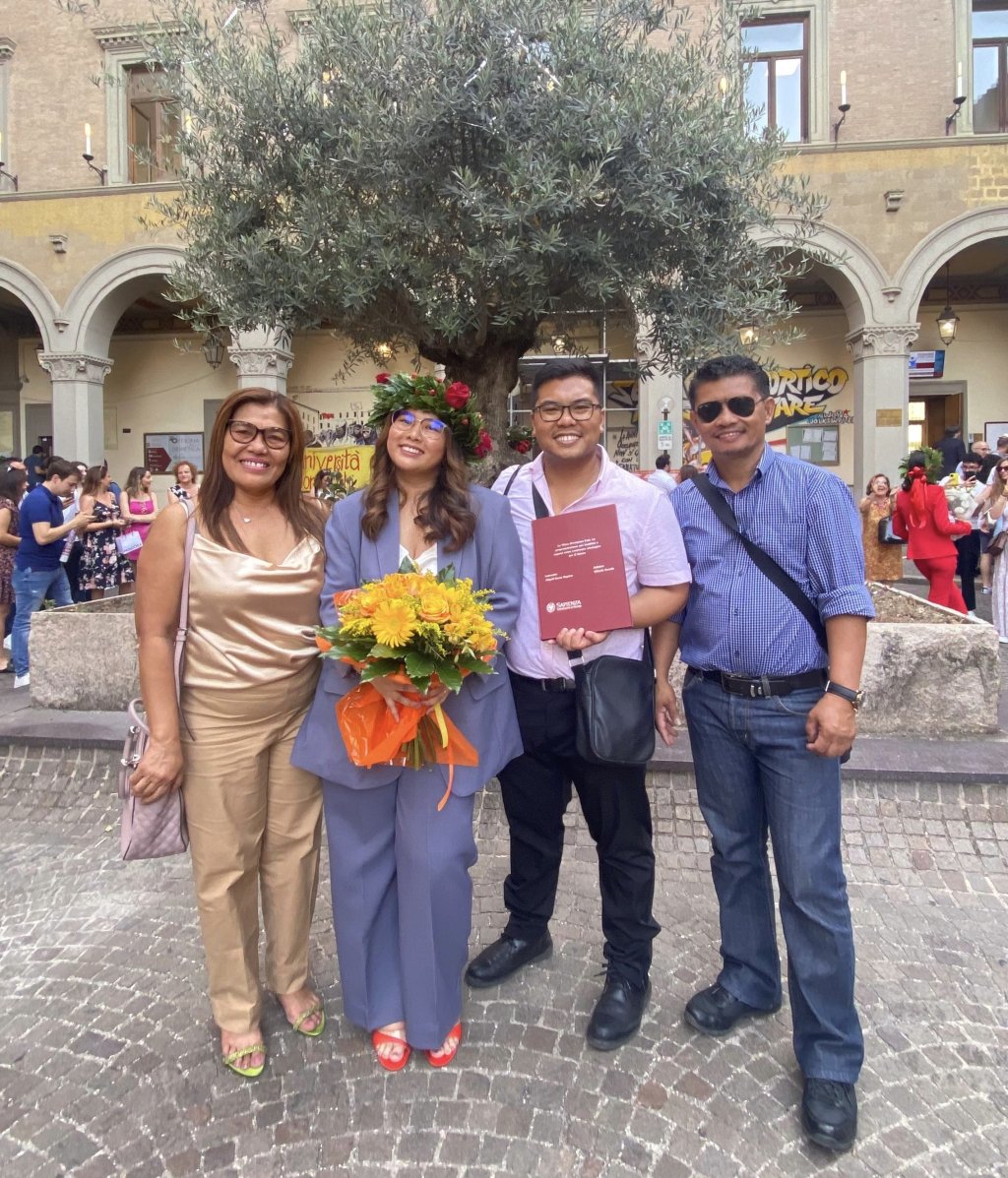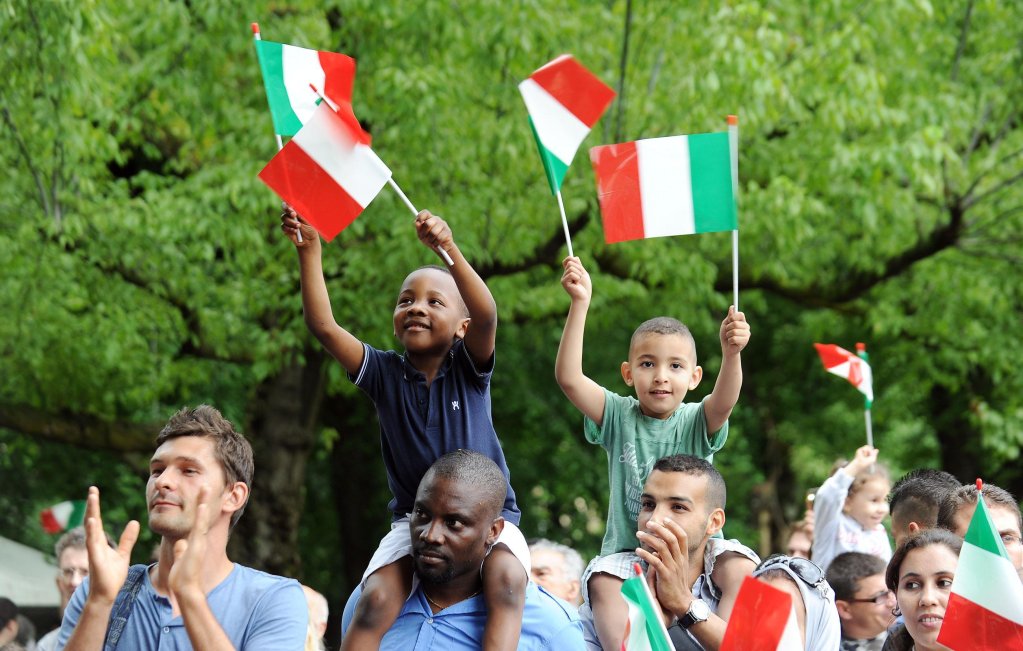Abe received her Italian citizenship in high school, while her older brother, Alan, had to wait until he turned 18 to apply. Under Italian law, children like Abe who are born in Italy to immigrant parents are not automatically granted citizenship.
Abegail Magsino was born in Italy, but did not become Italian until she was 14. Until then, her nationality had been Filipino, the same as both her parents. However, unlike her parents, Abe had never lived in the Philippines. Her memories of the Philippines were limited to holiday trips with her family.
Abe received her Italian citizenship in high school, while her older brother, Allen, had to wait until he turned 18 to apply.
"I have always lived in Italy. My studies were in Italian. My culture is Italian," Abe told InfoMigrants, adding that she could not understand why she had to apply for Italian citizenship.
"I think it's absurd. Why do I have to request for an Italian citizenship to say I am Italian? My whole life has been here," said Abe.
Still, Abe, who is now 24-years-old, recalls how happy she was to have both an Italian and Philippine passport.
"It was a very important achievement for me, especially for my mom. It felt like a recognition of her sacrifices. For me, I could finally say 'I am Italian and I am Filipino', not 'I am Italian but also Filipino'," said Abe.
Citizenship and identity
For Abe, receiving Italian citizenship was more than a bureaucratic milestone, it shaped and influenced her identity. Growing up in Rome, she often felt caught between two cultures. At home, she spoke Filipino and Italian. She and her brother honored the traditions of their parents' homeland through food, prayer, and acts of respect. Once outside the cocoon of home, Abe navigated the challenges of being seen as an outsider in the only country she knew.

Like many teens, Abe struggled with carving out an identity for herself. The discrimination she experienced in high school did not help. Teachers questioned her abilities, incorrectly assuming that she could not speak or understand Italian well enough to keep up with the classwork. She fixated on how different her skin and her nose were compared to her classmates, reinforcing her feeling of being different and "other".
Being exposed to students of diverse cultural backgrounds in university opened up new perspectives for Abe. "It wasn’t until then that I felt seen for my knowledge, not my skin color or origin."
For the first time, Abe also realized that she had no Italian friends. Laughing at the memory, Abe told InfoMigrants that she literally asked herself, "Why don’t I have any Italian friends?"
Abe started joining Italian organizations to meet people from different backgrounds. "I didn’t leave my Filipino friends or substitute them for my Italian friends. Growing older gave me the chance to expand my circle and recognize that everyone has something unique to offer. I think that’s beautiful," she explained.
Her dual identity – Italian and Filipino – became Abe’s source of strength. "I’m not just Italian or just Filipino. I’m both. When I’m with Filipinos, I feel Filipino. When I’m with Italians, I feel Italian. It’s not an identity crisis. It’s a mix that makes me who I am."
Read AlsoItaly: 900,000 migrants without citizenship – Ius Scholae could benefit 300,000
ius sanguinis
Under Italian law, children like Abe who are born in Italy to immigrant parents are not automatically granted citizenship. Except for rare cases where the parents are either unknown or are stateless, children of immigrant parents must wait until they turn 18 to apply, unless their parents acquire Italian citizenship while they are minors, as Abe’s parents did.
According to a 2018 IDOS Study and Research Centre/Statistical Dossier on Immigration, more than 1.3 million foreign minors were living in Italy at the start of 2018. These "second-generation immigrants" were grouped into 75 percent who were born in Italy to foreign parents and 25 percent who moved to the country at a very young age.

Italian citizenship is based on the principle of ius sanguinis (right of blood) which means that Italian citizenship is given as long as one or both parents are Italian, regardless of where the child was born. In contrast to this, ius soli (right of soil) grants citizenship to anyone born in the country, regardless of their parents’ nationality or immigration status.
Italy is regarded as having one of the toughest citizenship laws in Europe. Children of immigrant parents can apply for citizenship between ages 18 and 19, provided they prove uninterrupted residency in Italy. Missing this window risks facing a complicated bureaucratic process that could take at least three years – and a life of limbo and psychological uncertainty.
"It's the longest administrative procedure in Italy. An Argentine who has an Italian grandfather will be naturalized faster than a person born in Italy to foreign parents," immigration lawyer Antonello Ciervo told news agency Agence France Presse.
A 2023 report by the Italian National Institute of Statistics (Istat), Children and Youths, indicates that young Italians are more supportive of granting automatic citizenship to migrant children born in Italy (ius soli) than their foreign peers, The survey found 59.5 percent of Italian respondents aged 11 to 19 favored ius soli, compared with 53.1 percent of young foreigners.
Italy is home but the Philippines is the homeland
For Abe’s parents, acquiring Italian citizenship for her and her brother marked a culmination of their efforts to integrate into Italian society. Her parents came to Italy separately in the 90s and on two very different journeys.
The journey of her father, Randy, is a patchwork of murky details, pieced together from memories shared during dinner conversations.
There are stories of him coming to Germany first on a plane, then being deported and detained as what was then referred to as an "illegal migrant". Another – and finally successful – attempt to reach Italy involved going to Albania and getting to the south of Italy by boat.
"When I read about the stories of people crossing by boat now, I think of my father and how dangerous it was for him. When I ask him about it, I think he softens the details because I am his daughter. He just tells me, It’s ok now. Everything is fine."
Abe’s mother, Analiza, first worked in Tokyo and later decided to join her older sister in Italy. Because she had a regular and documented path to migration, it was easier for her to integrate into Italian society. She now works as a government employee and migration consultant.
Today, Abe proudly embraces her dual identity. She volunteers with both Italian and Filipino organizations, bridging the gap between her two cultures. She wishes that Italy's citizenship laws could be changed to reflect the realities and aspirations of children of immigrant parents. For children like her, the question isn’t whether they belong, it’s why they must fight so hard and so long to prove it.
